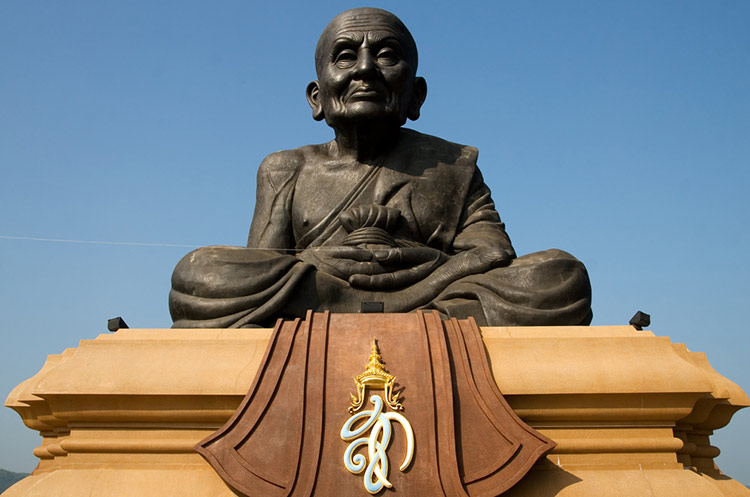
Learn & practice meditation
Meditation retreats and temples across Thailand
In Buddhism meditation is a means of developing the mind towards Nibbana and to reach a state of mind free of suffering caused by desires, ignorance, passion and aversion. Through meditation people can develop concentration, learn to see the true nature of things, achieve emotional positivity and a content state of mind.
Meditation techniques
Various meditation techniques can be used to develop the mind.
Vipassana or insight meditation aims to reach lasting happiness and to end the suffering and state of unsatisfactoriness caused by cravings, desires and attachment by realizing the true nature of things and their temporary character.
Samatha or calmness meditation uses various techniques to learn how to focus the mind including mindfulness with breathing, mantras and visual objects like the flame of a candle.
Staying in a meditation retreat or Buddhist temple
Living in a Buddhist temple or meditation retreat and practicing meditation takes effort. Usually the day starts very early, between 4 am and 6 am. Students are required to follow a number of rules. Some meditation retreats require no talking except during instruction sessions.
As virtuous conduct is instrumental in cultivating a pure mind, students are required to observe either the 5 or the 8 precepts which are:
- Abstain from being harmful to all living beings
- Abstain from stealing
- Abstain from sexual misconduct (5 precepts) / refrain from sexual contact (8 precepts)
- Abstain from false speech
- Abstain from consuming alcohol, using drugs and smoking
- Abstain from eating after 12 noon
- Abstain from dancing, singing, playing music, watching entertainment shows, wearing perfume and make up
- Abstain from high or luxurious places for sitting or sleeping
It is advisable to contact a temple or meditation retreat well in advance and inquire about clothing requirements, whether meditators eat 2 or 3 times a day, accommodation, daily schedule, whether the teachers speak English and the rules you are expected to follow.
Meditation retreats and temples across Thailand
Across Thailand are countless meditation retreats and Buddhist temples where meditation can be practiced. Below is a short list of a few of them and their websites.
- Wat Mahathat temple in Bangkok (go to their website)
- Chom Thong Insight meditation center at Wat Phra That Si Chom Thong temple near Chiang Mai (go to their website)
- Wat Suan Dok temple in Chiang Mai (go to their website)
- Wat Umong temple in Chiang Mai (go to their website)
- Wat Tham Wua in Mae Hong Son (go to their website)
- Wat Khao Tham on Koh Phangan island (go to their website)
- Wat Suan Mokkh in Surat Thani (go to their website)
- Doi Suthep Vipassana meditation center at Wat Phra That Doi Suthep in Chiang Mai (go to their website)
- Wat Thaton temple in Chiang Mai
If you are a beginner it is advisable to choose a temple away from the noise and hectic of the city. Select a rural or forest temple for example the Wat Suan Mokkh or Wat Khao Tham where instructions are given in English language in a peaceful, natural and quiet setting.
Temple customs and behavior, interacting with monks
Whether you practice meditation in a retreat or in a temple, always be respectful towards everyone and follow Thai customs. If you are not sure, observe what Thai people do and follow their example. Be especially respectful towards monks and images of the Buddha.
Thai people use the wai (Anjali), a gesture of showing respect used in everyday life when greeting people. The wai is done pressing the palms of the hands together while making a slight bow.
When talking with a monk hold the hands in the wai gesture for the duration of the conversation. Also make a wai after giving something to a monk or before receiving something from a monk. Monks will not return the wai gesture.
Monks sit in a higher position than lay people on a chair or on a raised platform, while the lay people sit on the floor. When seated make sure your feet are pointing away from the monk. When walking past a seated monk bend a little forward.
Women cannot touch a monk or give something directly to a monk. They also cannot stay alone in a closed room with a monk.